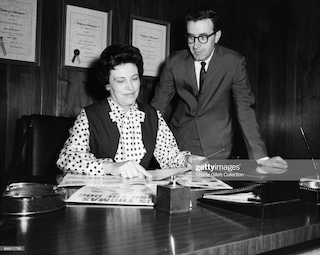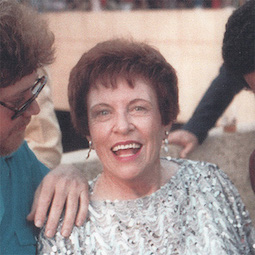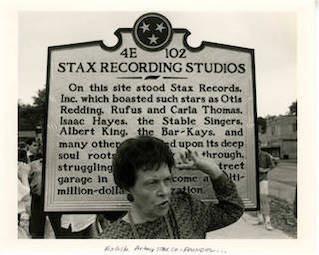


Estelle Axton was born on September 11, 1918 in Middleton, TN. After growing up on a farm, she moved to Memphis to become a schoolteacher where she married and had two kids. In 1958, Estelle was approached by her brother Jim Stewart, who asked her to get into the music business with him. They would need a way to finance their new label, so Estelle mortgaged her home. With the $2500 mortgage, they bought an Ampex console and were in business. The two set up in a vacant building, naming their company Satellite Productions. Eventually, they rented out Capitol Theatre for $100 a month, where Estelle ran a record shop in the foyer that generated enough profit to keep the budding recording company afloat. When they began to gain national traction through a distribution deal with Atlantic Records, Satellite Records out of Los Angeles confronted the Memphis business about their ownership of the name. Deciding to change the name, Estelle and Jim took the first two letters of their last names - Stewart and Axton - to create Stax Records.
As Stax grew, it became apparent that Estelle had an incredible talent for finding artists that would sell. When she heard “Last Night” by the Mar-Keys, she knew it was a hit. Although the fact that her son played saxophone in the group brought her enthusiasm into question, Estelle was able to convince the rest of the team at Stax that they had to put it out. Begrudgingly, they conceded to move forward with the song. Her brother bet her $100 it would never sell. When it was finally released, it went to No. 2 on the national charts.
Not only was Estelle trying to get her business off the ground, but people working at Stax came to her for advice and comfort. When asked about her, Isaac Hayes said,
“Estelle was a very generous woman. She was generous with her time, with her counsel, with her advice … Mrs. Axton, you didn’t feel any backoff from her, no differentiation that you were black and she was white. Being in a town where that attitude was plentiful, she just made you feel secure … She was like a mother to us all.”
Estelle believed in supporting young artists to pursue their passions, and was known to never say no to hearing someone audition no matter how busy she was. She also called for a less competitive and hostile music industry in Memphis, saying local businesses should instead collaborate with and support each other. On her vision for a community-like music industry, she said,
“There are powers in numbers, and when you work together and cooperate with each other, that’s when you can make something big.”
In 1970, Estelle was bought out of Stax before it crashed, partially because she was not a fan of the newest partner Al Bell and wanted out. Part of the negotiations of her buy-out was a non-competitive agreement that prevented Estelle from entering the music business for five years. When the agreement was up, she decided to get back to her first love, discovering new talent, and founded Fretone Records with her son-in-law. Knowing disco was the new trend, Estelle put out “Disco Duck” by Bobby Manuel and Rick Dees in 1976, which eventually went No. 1 on the US charts. Because of the duck voice, she believed it would either be a hit with adults, or it would be a hit with children and adults would have to buy the record for them.
Estelle retired in 1982 but remained active in the Memphis Music Commission and Memphis Songwriters associations. She passed away in 2004 at 85 years old.
Continue reading:
Goin’ Back to Memphis by James Dickerson
Memphis and Shelby County Room at the Memphis Public Library